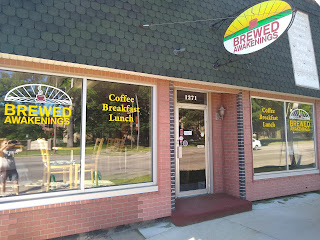Place in Fiction (2012)
Originally published as a Facebook Note July 11, 2012. I did nothing with this idea, but maybe I should have? Maybe I still can? I did get a lot of great suggestions in the comments.
I'm tagging librarians and English teachers on this, but anyone can answer: What are the best/most notable/your favorite uses of place in fiction?
Discursive explanation follows:
For a few years, I've taught an interdisciplinary course in Coe's first-year seminar program called "A Sense of Place," largely as a free-associating bundle o' chaos careening wildly among various subjects having some loose element of place in them. Before I teach it again, I would like to achieve two things that seem to me contradictory. ("Do I contradict myself? Very well then...") The first is to clarify the core elements of the geographic concept of place, in order to inform whatever we discuss. The second is to study the many ways in which place informs fields outside of geography. Once I do these, I may be able to cram them back into one semester-long FYS bottle.
One endeavor that is clearly influenced by place is fiction. To varying degrees, the stories authors tell are informed by their settings. After surveying some lists of "best novels of all time"--including the remarkable 1005 works listed at thegreatestbooks.org--it seems like there are maybe five degrees of placedness in novels.
- Placeless novels. Stories of journeys, like Huckleberry Finn, which is a good example of two placed characters--Huck and Jim--getting out of their place. They visit places on their journey down the Mississippi, but none for very long. Their story is one of movement. Kerouac's On the Road sounds like it belongs in this category, too.
- Nominal places. These are stories that are set in specific places, either because they're riffing off some event that happened there, or because they had to be set somewhere so why not there? I'd put Gone With the Wind in the first category. The Civil War mostly occurred in the American South, particularly the Southeast, so it made sense to locate a Civil War novel in Atlanta rather than in Hamilton, Ontario. I don't recall that Atlanta impacts the novel, though, beyond supplying the turf on which it occurs. Semi-autobiographical novels are placed in towns similar to the author's hometown, but don't necessarily have to be there. Swann's Way, The Sun Also Rises, and 1984 occur in specific places, but the places seem to me to be incidental to the novel.
- Significant places. A turning point in Pride and Prejudice occurs when Elizabeth Bennett visits Darcy's estate at Pemberley, and the grounds and home are fully described. Most of the novel, however, occurs at the Bennett residence in rural Hertfordshire, some specific aspects are described but which are less important to the story.
- Fantasy places. These are in a separate category, because I'm not sure how to handle them. Places like Hogwarts aren't found in God's creation, but play a central role in the Harry Potter novels. I'd say the same for Narnia, at least in The Lion, the Witch and the Wardrobe, and even the forest in the Winnie-the-Pooh stories. I don't read much science fiction, but there probably are some really good descriptions of alternate worlds that play a central role in the stories. Mars in The Martian Chronicles? I'm less sure about Tolkien's Middle Earth... they do a lot of traveling in those novels.
- Places as characters. The extreme instances of place in fiction, which would be most appropriate to "A Sense of Place," would be where the novel is at least in part about the place. The place becomes like a character in the novel, being as organic as the human protagonists. I think of the ghetto neighborhood in The House on Mango Street, the small towns in Main Street and Winesburg, Ohio, the garden in The Secret Garden.
That pretty vague by way of definition, but it's as far as I'm willing to go now given I'm just getting started and don't really know what I'm talking about. So I'm inclined to draw lines but to err on the side of inclusiveness. One common element in the novels listed in category #5 is that they are named after the places, although that's not a hard-and-fast rule. Slaughterhouse-Five is less about the prison than about what goes on in Billy Pilgrim's mind; The Merchant of Venice could just as easily have been titled The Merchant of Hamilton, Ontario, except that I don't think Hamilton was founded until well after Shakespeare's time. On the other hand, The Shipping News definitely belongs.
Thanks to these quick-and-dirty lists readily available on the Internet, I'm armed with quite a load of intriguing recent titles I'm going to have to check out (in both senses of the phrase), including Lanark by Alasdair Gray ("seething vision of Glasgow... a Scottish classic), How German Is It? by Walter Abish which depicts changes in contemporary Germany, Gilead by Marilynne Robinson ("an elderly congregationalist pastor in the small secluded town of Gilead, Iowa"), and Drop City by T. Coraghessan Boyle ("a group of free spirits, not unlike the inhabitants of the real Drop City in Colorado"). I probably--no, certainly--won't get to all of them, but even knowledge of their existence will inform the class.
What else should I look at?



Comments
Post a Comment